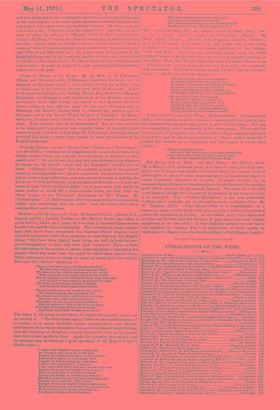POETRY.—The Masque of the Gods. By Bayard Taylor. (Boston, U.S.,
Osgood and Co.; London, Trilbner.)—Mr. Bayard Taylor has taken a great subject, which in a poem of less than a thousand lines he can handle but superficially and partially. The divinities in whom various ages and races have recognised the Supreme Power deplore their departed greatness, while they recognise in some dim way the Mighty Being, "the Voice from Space," from whom, as well as from the pro- jected imagination of man, they have their existence. Then we have the utterances of the powers of nature acknowledging or lamenting the change which has come over the spirit in which man regards them. These utterances strike as being as good as anything in the volume, Here are the "Rivers" speaking:— " We are loud and silent, we hasten and daily, We bless and waste. as in days that are dead; We dance on the hillside and sleep in the valley,
With the rocks as a cradle, the reeds as a bed; But the nymphs of our fountains leave them untended. And the god of the stream is gone from his own; The term of our human beauty is ended, And its liquid graces shall never return.
"We have and west), we speed in our courses, We urge and pilot, we cheer and call; We wander and widen, with fetterless forces, Servants and lovers and lords of all! The pulses of Life, in our veins unshaken, The movement of Life, in the tides we pour. Still bind us to moo, with a secret token, And keep us kindred, though none adore."
'The defect of the poem is that where we expect the greatest power we do not find it. "The Voice from Space," whose words should be those of a wisdom, so to speak, ineffable, speaks Common-place; and Elohim and Immanuel, in whose utterances the poet feels himself bound to keep near the language of Scripture, express themselves with far less power than does either Apollo or Jove. Apollo, for instance, thus speaks, and the passage may be taken as a good specimen of Mr. Bayard Taylor's blank verse :—
" I come your shepherd of the sunny hills
In Thessaly, wha from the reedy pipe Allured the hidden sweetness of your breath ; And made a music of your empty lives. I taught ye beauty, harmony, and grace: I lifted and ennobled ye ; I clothed Your limbs with glory and your brows with song. Nature, the hard, unfriendly mother, gave Her sweetest milk to nourish ye anew, And all her forms, as lovers or as friends, Moved in your life, and led your shining march Of ages, as a triumph! Still I walk, Though unacknowledged, filling hungry ears With purer sound, and brightening weary eyes With visions of the beauty that may be. For Beauty is the order of the Gods, The ether breathed alone by souls uplift In aspiration, and the crown of all, Save whom dumb darkness anti the bestial life Tread out of being. Reaching her, ye live."
But a well-read man like our author ought to know that " ye" is not a proper objective form. — Out-of-Door Rhymes. By Eliza Sproat Turner. (Boston, U.S., Osgood ; London, Triibner.) —A book of mostly good verses, the only poem that seems really a failure being the longest and most ambitious in the volume, " Old and New." The "woody, wheezing Dryad," and the "bald Undine," beings of an obsolete faith, are not very happily imagined or described. When Mrs. Turner deals with quite a humble subject, as in "A Little Goose," a very pretty sketch of a lost child, she is remark- ably successful. Of the more serious poems, we like, "In the Garden " the best. Of this we give two stanzas :— "See yon tortoise.—he crossed the path At noon to hide where the grass is tall; Inn slow dull sense of the Sun.King's wrath, Burrowing close to the garden wall. Think, could we flood that torpid brain With man's whole life—love, joy, and pain!
"So, methinks, is the life we lead To the larger life that yet shall he; Narrow in thought, uncouth in deed: Crawling, who yet shall walk so free; Walking, who yet on wings shall soar: Flying, who shall need wings no more."


































 Previous page
Previous page